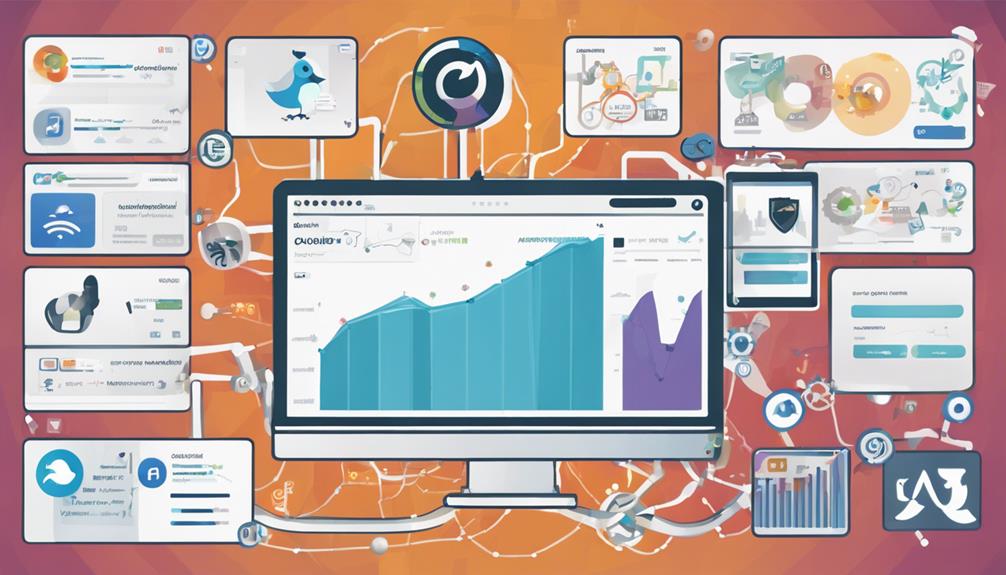
To enhance your SEO using social media backlinks, start by targeting platforms where your audience actively engages. Share quality content that resonates with them, incorporating strong emotions and eye-catching visuals to boost shareability. Engage directly by responding to comments and personalizing interactions to foster deeper connections and encourage more sharing. Regularly track the performance of these links through tools like Google Analytics to understand their impact on your site's traffic and search rankings. By continuously adapting your strategies to align with algorithm changes and audience behavior, you'll likely see improved SEO results. Further exploration will reveal even more ways to optimize your efforts.
Understanding Social Media Backlinks

Social media backlinks can significantly boost your website's SEO, but first, you need to understand what they are. Essentially, these are links from social media platforms that direct users to your website.
While traditional backlinks from reputable websites are crucial, social media backlinks also play a key role by signaling to search engines that your content is relevant and valuable.
When someone shares your content on social media, it creates a pathway for others to follow, which increases your site's visibility and traffic. This increase in traffic tells search engines that your content is useful, potentially raising your site's ranking in search results.
It's not just about the number of clicks; the engagement level with your linked content also matters. Comments, shares, and even the context within which your link is shared can affect the SEO impact.
Identifying Valuable Social Platforms
Identifying the most beneficial social platforms for your SEO strategy isn't just about picking the most popular ones; it's about finding where your specific audience actively engages.
You've got to dig into the demographics and behavior patterns of users on various platforms. For instance, if you're targeting a younger demographic, platforms like TikTok or Instagram might be more valuable than LinkedIn.
You should also consider the nature of your content. Visual products or services often gain more traction on image-heavy platforms such as Pinterest or Instagram.
On the other hand, if your content is more professional or B2B oriented, LinkedIn could be your gold mine.
Don't overlook niche platforms that might be particularly relevant to your industry. These can offer highly engaged audiences that larger platforms may not.
For example, if you're in the gaming industry, Twitch or Discord could be more advantageous than Facebook.
Lastly, analyze the potential for engagement and interaction. Platforms that encourage sharing and discussion can help amplify your backlinks significantly.
It's about quality, not just quantity. Where can you spark conversations? Where does your content naturally fit in? Answering these questions will guide you to the right platforms.
Creating Shareable Content

To maximize the impact of your SEO efforts, you'll need to craft content that naturally invites sharing. Imagine you're creating something so irresistible that your audience can't help but spread the word. Here's how you can make that happen.
First, understand what resonates with your audience. Dive into their interests, needs, and pain points. You're not just creating content; you're crafting solutions and experiences that speak directly to them.
Whether it's an insightful infographic, a captivating video, or a compelling article, make sure it strikes a chord.
Next, focus on the emotional pull. Content that evokes strong emotions – joy, surprise, even outrage – is more likely to be shared. Think about what emotions drive your audience and how you can tap into them.
Don't forget the visuals. Aesthetic appeal can significantly boost shareability. Bright, eye-catching images or sleek, professional designs can make your content stand out in a crowded feed.
Lastly, make your content easy to share. Include obvious share buttons and compelling calls-to-action. You want your audience to think, "I've got to show this to my friends!"
The smoother the sharing process, the wider your content will spread.
Engaging With Followers
Once you've mastered creating shareable content, engaging directly with your followers becomes the next step to amplify your SEO through social media. By interacting with your audience, you're not just building relationships; you're also increasing the likelihood of your content being shared across platforms, which can lead to valuable backlinks.
Here's how you can effectively engage with your followers.
Firstly, always respond to comments and questions on your posts. This interaction not only shows that you value your audience's input, but it also encourages further engagement, making your social media pages more active and visible.
Don't forget to personalize your responses; a touch of personalization can make your followers feel valued and more likely to engage with your content again.
Additionally, run regular polls and ask questions to spark conversations and gather insights about your followers' preferences and needs. This information can guide your future content creation, making it more relevant and engaging.
Lastly, host live sessions where you can interact in real-time. These sessions are a goldmine for increasing engagement and strengthening your connection with your audience.
They provide a platform for immediate feedback and foster a sense of community around your brand.
Tracking Backlink Performance

Monitoring your backlink performance is crucial to understanding the impact of your social media efforts on your SEO strategy. You've been working hard to create engaging content and fostering interactions that earn backlinks, but how do you know if it's paying off? It's time to dive into the analytics.
Start by using tools like Google Analytics or Ahrefs to track the referral traffic from each backlink. You'll want to see not just how many clicks you're getting, but also the quality of this traffic. Are the visitors staying on your website, engaging with your content, or bouncing right off? This data tells you a lot about the relevance and quality of your social media links.
Next, keep an eye on your search engine rankings. Effective backlinks from high-authority sites should boost your position in search results. Notice any shifts in your rankings and correlate these changes back to your recent social media activity. This insight helps you understand which types of posts and which platforms are most beneficial for your SEO.
Lastly, don't just set it and forget it. Regularly review your backlink performance. Adjust your strategy based on what's working and what isn't. This proactive approach will ensure your efforts aren't just a shot in the dark but a targeted strategy to enhance your online visibility.
Adapting Strategies for Algorithm Changes
As you regularly review your backlink performance, consider how search engine algorithm updates can impact your SEO success. These changes can suddenly alter the effectiveness of your existing backlinks and demand a swift strategic response.
Firstly, stay informed about updates. You'll need to keep an eye on SEO news from sources like Google's Webmaster Blog or industry newsletters. Understanding what's new in the algorithms helps you anticipate how your backlinks might be evaluated differently.
Secondly, diversify your backlink sources. Don't just rely on one social media platform for all your links. Spread them across different channels like Twitter, Facebook, LinkedIn, and Instagram to mitigate risks associated with algorithm changes on any single platform.
You should also regularly audit your backlinks. This isn't just about checking if the links are still active; it's about evaluating their quality post-algorithm update.
Remove or replace any that are no longer effective or could potentially harm your SEO due to changes in how search engines assess link quality.
Frequently Asked Questions
Can Social Media Backlinks Directly Influence My Website's Pagerank?
Social media backlinks don't directly boost your website's PageRank since they're typically nofollow links. However, they can increase visibility and drive traffic, indirectly improving your SEO through increased engagement and potential link sharing.
How Do Nofollow Links From Social Media Impact Seo?
Nofollow links from social media don't directly boost your SEO rankings, but they're valuable for driving traffic and increasing visibility. They indirectly benefit your SEO by enhancing user engagement and content reach.
Are Backlinks From Personal Social Profiles Effective?
Yes, backlinks from your personal social profiles can be effective. They increase visibility and direct traffic, though they're often nofollow and don't directly boost SEO rankings. Focus on quality content to engage your audience.
How Often Should I Audit My Social Media Backlinks?
You should audit your social media backlinks quarterly to stay updated on their effectiveness and relevance. Regular checks help you identify any issues early, ensuring your online presence remains strong and beneficial.
What Legal Considerations Apply When Using Others' Content for Backlinks?
When using others' content for backlinks, you must ensure it's legally permissible. Always obtain permission, credit the source, and adhere to copyright laws to avoid legal issues and maintain ethical standards.
Conclusion
Now you've got the tools to boost your SEO with social media backlinks. Choose the right platforms and create content that begs to be shared. Engage actively with your followers and keep an eye on how those backlinks perform. Remember, the digital landscape is always changing, so stay adaptable and ready to tweak your strategy. By staying engaged and proactive, you'll see your site's search engine rankings climb—making all your efforts worthwhile.






